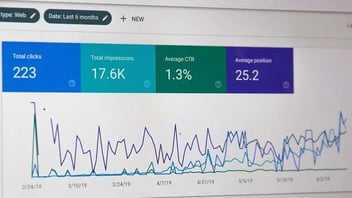The Missing Link in SEO: Why You Lose Backlinks and What To Do
Have you ever poured your heart and soul into creating amazing content, only to see it languish in the search engine results pages (SERPs)? You're not alone. Many website owners underestimate the importance of backlinks, a crucial factor in SEO success.
Backlinks are essentially votes of confidence from other websites. When a high-quality site links to yours, it tells search engines your content is valuable and relevant. The more backlinks you have, the higher your website will rank for relevant keywords.
This begs the question: Why would you ever lose backlinks? Unfortunately, it's an all-too-common occurrence.

Why Do Backlinks Matter?
Before we delve into the challenges of backlink loss, let's reaffirm the critical role backlinks play in a successful SEO strategy. Think of backlinks as digital recommendations; they're votes of confidence from other websites, signaling to search engines that your content is valuable and relevant.
-
Backlinks account for 17.8% of Google's ranking algorithm.
-
Websites in the top 10 search results have an average of 3.8 times more backlinks than those on page two.
-
Losing 10% of your total backlinks can lead to a 5-10% decrease in organic traffic.
Increased Web Traffic
One of the most immediate benefits of backlinks is increased website traffic. When another website links to yours, it's like a digital referral. You're tapping into their audience, potentially bringing in new visitors who might not have found you otherwise. This is especially powerful when you earn backlinks from high-authority websites with a large following.
Improved Search Engine Rankings
Search engines like Google consider backlinks a significant ranking factor. The more high-quality backlinks your website has, the higher your chances of ranking well for relevant keywords. It's a clear signal to search engines that your content is authoritative and trustworthy. Imagine backlinks as a popularity contest; the more websites "like" yours by linking to it, the more likely you are to climb the search engine rankings.
Enhanced Brand Authority
Backlinks from reputable websites can significantly boost your brand's authority—like getting an endorsement from a trusted expert. When other credible sources link to your content, it establishes you as a knowledgeable and reliable resource in your industry. This increased trust can lead to higher conversion rates, better customer engagement, and a stronger brand reputation overall.
Expanded Reach and Visibility
Backlinks help expand your website's reach beyond its existing audience. When people click on a link to your site from another website, you introduce your brand to new potential customers. This increased visibility can lead to more opportunities for growth and business development.
In essence, backlinks are the lifeblood of a strong online presence. They drive traffic, improve search rankings, enhance brand reputation, and expand your reach. While building high-quality backlinks can be challenging, the rewards are substantial.
The Disappearing Act: Why Backlinks Go Missing
The internet is a dynamic landscape, and backlinks are no exception. Here are some common reasons why your hard-earned backlinks might vanish:
Website Changes and Content Removal
-
Website Redesign or Relocation: When you revamp your website or move to a new domain, there's a risk of broken backlinks. If old URLs aren't properly redirected (301 redirects), search engines may struggle to find your content, and your backlinks will effectively disappear.
-
Content Removal: While it's essential to keep your website fresh and relevant, removing old content can inadvertently lead to backlink loss. If other websites are linked to a page that no longer exists, those backlinks will become broken.
Website Inactivity and Link Rot
-
Website Inactivity: Search engines prioritize active websites. If your site becomes stagnant with infrequent updates, your backlinks may lose their value over time. Search engines may perceive a lack of updates as a sign of a neglected website.
-
Link Rot: The internet is constantly evolving. Websites go offline, domains expire, and content disappears. This can cause backlinks to become broken, even if your website remains active.
External Factors and Negative SEO
-
Domain Expiration: If a website linking to yours goes out of business or neglects to renew its domain, the backlink will be lost.
-
Link Removal: Sometimes, website owners might remove links to your site due to various reasons, such as changes in editorial guidelines or a desire to declutter their link profile.
-
Negative SEO: While less common, malicious competitors might attempt to harm your rankings by building low-quality or spammy backlinks to your website. This can trigger penalties from search engines.
Understanding these common causes of backlink loss is crucial for protecting your hard-earned link equity.
Should You Be Worried About Losing Backlinks?
Backlink loss is a natural part of the SEO landscape, but it's essential to monitor your backlink profile for significant drops. While losing a few backlinks here and there is usually nothing to worry about, a sudden or substantial decline can negatively impact your website's search engine rankings.
Key signs to watch for:
-
Sudden and unexplained drops in organic traffic: A significant decrease in traffic might indicate a loss of valuable backlinks.
-
Lower search engine rankings: If your website starts to slip in search results for important keywords, it could be linked to backlink loss.
-
Increased competition: If your competitors are gaining ground in the rankings, it's worth investigating their backlink profile to see if they've experienced significant growth.
If you notice any of these signs, it's time to take action:
-
Analyze your backlink profile: Use tools like Google Search Console, Ahrefs, or Moz to identify lost backlinks and assess their quality.
-
Identify the cause: Determine the reason for the backlink loss. Was it due to website changes, content removal, or other factors?
-
Recover lost backlinks: If possible, reach out to website owners to request that they restore the links.
-
Build new backlinks: Focus on creating high-quality content and building relationships with other websites to acquire new backlinks.
-
Disavow toxic backlinks: If you've identified low-quality or spammy backlinks, you can use Google's Disavow Tool to inform search engines that you don't endorse these links.
By staying proactive and monitoring your backlink profile, you can mitigate the negative impact of backlink loss and maintain a strong online presence.
Reclaiming Lost Backlinks and Building New Ones
Reclaiming Lost Backlinks
Reclaiming lost backlinks is often more efficient than building new ones from scratch. Here's how you can go about it:
-
Identify Lost Backlinks: Use backlink analysis tools like Ahrefs, SEMrush, or Moz to identify broken or removed backlinks.
-
Understand the Reason: Try to determine why the link was lost. Was it a website redesign, content removal, or something else?
-
Craft a Persuasive Outreach: Reach out to the website owner or webmaster with a polite and professional email. Explain the situation, apologize for any inconvenience, and provide a clear solution. For example, if the link was lost due to a website redesign, offer to update the link to the correct page.
-
Offer Value: If possible, offer additional value to the website owner, such as guest posting, social media promotion, or other mutually beneficial opportunities.
-
Persistence is Key: Don't be discouraged if you don't receive an immediate response. Follow up politely after a week or two.
Building New Backlinks
Building high-quality backlinks is an ongoing process. Here are some effective strategies:
-
Create Exceptional Content: High-quality content is the foundation of successful link-building. Create content that is informative, engaging, and shareable.
-
Guest Posting: Contribute guest posts to relevant websites in your industry. This allows you to share your expertise and include a link back to your website.
-
Broken Link Building: Find broken links on other websites and offer your own content as a replacement.
-
Influencer Outreach: Build relationships with influencers in your niche and collaborate on content or promotions.
-
HARO (Help a Reporter Out): Respond to journalist queries on HARO to get your expertise featured in media outlets.
-
Local SEO: Focus on building backlinks from local directories, business listings, and community websites.
-
Social Media: Share your content on social media platforms to increase visibility and attract backlinks naturally.
-
Link Reclamation: As discussed earlier, reclaiming lost backlinks can be a valuable part of your link-building strategy.
Remember: Quality is always more important than quantity when it comes to backlinks. Focus on building relationships with other websites and creating content that people naturally want to link to.
How Many Backlinks Should You Have?
The age-old question of how many backlinks you need is a tricky one. There's no magic number that guarantees SEO success. The ideal quantity of backlinks varies widely depending on your industry, the competitiveness of your target keywords, and the overall quality of your website.
Rather than chasing a specific number, focus on building a high-quality backlink profile. A single link from a reputable, relevant website can be far more valuable than dozens of low-quality links. Search engines prioritize websites with authoritative backlinks, so it's essential to build relationships with credible sources in your industry.
A diverse backlink profile is another key factor. Relying solely on one type of backlink can raise red flags with search engines. Aim for a mix of backlinks from various sources, including:
-
Industry Publications: Getting featured in reputable industry publications can provide valuable backlinks and enhance your brand's authority.
-
Guest Blogging: Contributing high-quality articles to other websites allows you to share your expertise while earning backlinks to your site.
-
Directories and Listings: Submitting your website to relevant online directories and business listings can help build your backlink profile, especially for local SEO.
-
Broken Link Building: Identifying broken links on other websites and offering your content as a replacement is a strategic way to acquire high-quality backlinks.
Remember, building a strong backlink profile takes time and effort. Focus on creating valuable content, earning trust with your audience, and cultivating relationships within your industry. By prioritizing quality and diversity, you'll be well on your way to improving your website's search engine rankings.
Backlinks: Your Website's Lifeline
Backlinks are the cornerstone of a successful SEO strategy. They boost your website's visibility, authority, and traffic. However, maintaining a healthy backlink profile requires vigilance. Understanding why backlinks disappear is crucial for preventing future losses and reclaiming valuable links.
Remember, quality always trumps quantity. Focus on building relationships with other websites, creating exceptional content, and earning natural backlinks. By consistently monitoring your backlink profile and implementing effective strategies, you can strengthen your online presence and achieve long-term SEO success.
Aspiration Marketing understands the complexities of SEO and offers expert guidance to help businesses thrive in the digital landscape.
Contact us today to learn how we can elevate your website's visibility and drive tangible results!
This content is also available in:
- German: Verlorene Backlinks, Ranking im Keller? Drehen Sie den SEO-Trend um
- Spanish: El eslabón perdido en SEO: Por qué pierdes backlinks y qué hacer
- French: Le chaînon manquant du SEO : Pourquoi vous perdez des backlinks ?
- Italian: L'anello mancante nella SEO: Perché si perdono backlink e cosa fare
- Romanian: Veriga lipsă în SEO: De ce pierdeți backlink-uri și ce să faceți
- Chinese: 搜索引擎优化中缺失的环节:失去反向链接的原因及对策

Joachim is a certified HubSpot trainer with over 13 years of experience in content marketing, strategy, website development, and SEO. He has implemented numerous large-scale, international growth marketing programs, including one with UiPath, which grew from a startup to a successful IPO on the NYSE. Joachim has special expertise in multilingual marketing and sales enablement projects, and he uses the latest AI technologies to help our clients.








Leave a Comment